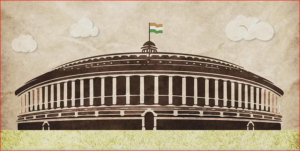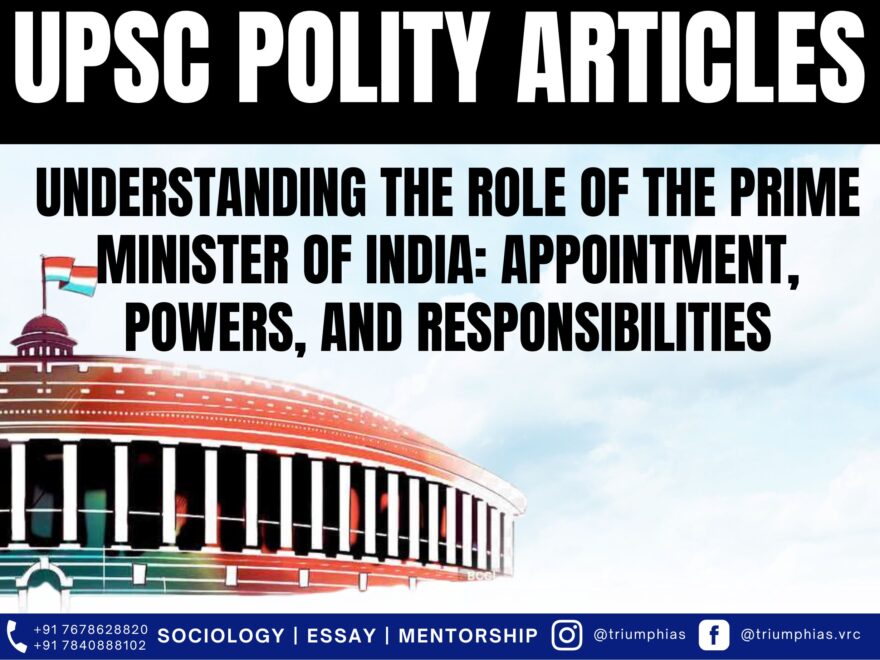Prime Minister of India
(Relevant for Polity Section of General Studies Paper Prelims/Mains)

PRIME MINISTER OF INDIA
The Prime Minister plays a pivotal role in India’s political framework as the head of the government and de facto head of state.
Appointed by the President of India, the Prime Minister leads the party or coalition that holds the majority of seats in the Lok Sabha, the lower house of India’s parliament. The Prime Minister holds the responsibility for government administration and acts as the primary spokesperson for the government’s policies. As per Article 75, the President appoints the Council of Ministers based on the Prime Minister’s advice. Additionally, Article 74(1) stipulates the presence of a Council of Ministers led by a Prime Minister to offer guidance and recommendations to the President. Consequently, other ministers function under the guidance of the Prime Minister. Consequently, within India’s parliamentary system, the Prime Minister’s role has assumed immense importance, to the extent that India’s form of government is referred to as a ‘Prime Ministerial Government’.
Appointment of the Prime Minister
- The Constitution does not outline a specific procedure for the selection and designation of a Prime Minister.
- Article 75 states that the appointment of the Prime Minister is carried out by the President. However, this provision doesn’t imply that the President can select any individual as the Prime Minister.
- In accordance with the norms of a parliamentary system, it is customary for the President to appoint the leader of the majority party in the Lok Sabha as the Prime Minister.
- In instances where no party holds a clear majority in the Lok Sabha, the President has the discretion to decide on the appointment of the Prime Minister.
- In such scenarios, the President generally opts for the leader of the largest party or coalition in the Lok Sabha to assume the role of Prime Minister. This leader is then asked to secure a vote of confidence from the House within a span of one month.
Oath, Term, and Salary
- Oath: Prior to assuming the role of the Prime Minister, the President administers the oaths of office and confidentiality to the Prime Minister-Elect.
As a component of this oath-taking, the Prime Minister pledges:
- To hold true faith and loyalty to the Constitution of India,
- To uphold the sovereignty and unity of India,
- To conscientiously fulfil the responsibilities of the office with dedication,
- To treat all individuals fairly and equitably in line with the Constitution and the law, without any fear, bias, favouritism, affection, or animosity.
- Term: The duration of the Prime Minister’s tenure is not fixed; they serve in the capacity at the discretion of the President. Nonetheless, this does not imply that the President has the authority to dismiss the Prime Minister at any point. As long as the Prime Minister maintains the majority’s backing in the Lok Sabha, the President cannot terminate their position. However, if the Prime Minister loses the confidence of the Lok Sabha, they are obligated to resign, or the President may opt to dismiss them.
- Salary: The Parliament periodically establishes the Prime Minister’s compensation and additional benefits. This encompasses the remuneration and advantages provided to a Member of Parliament, along with supplementary privileges like an allowance for personal expenses, furnished housing, travel allowances, and access to medical facilities
The authority of the Prime Minister of India can be broadly classified into the following areas:
- Executive Authority: Serving as the head of the Union Council of Ministers, the Prime Minister holds the responsibility for governing the administration. This includes chairing cabinet meetings and orchestrating the activities of various ministries and departments.
- Legislative Influence: As a member of either the Lok Sabha or the Rajya Sabha, the Prime Minister has the right to participate in the proceedings of both houses. Additionally, they provide counsel to the President regarding the convening, concluding, and dissolving of parliamentary sessions, particularly that of the Lok Sabha.
- Diplomatic Role: The Prime Minister serves as the representative of India on the global stage, engaging in negotiations with foreign nations. Furthermore, they receive foreign dignitaries and diplomats on behalf of the President.
- Emergency Prerogatives: During periods of national crisis, the Prime Minister offers advice to the President concerning the necessary steps to safeguard India’s security.
- Appointment Responsibilities: The Prime Minister, along with the Council of Ministers, advises the President regarding the appointments to prestigious positions in the higher judiciary and critical administrative roles. These roles encompass those of Governors, the Chief Election Commissioner, the Comptroller and Auditor General of India, and the Attorney General of India.
- Financial Oversight: Taking charge of the overall economic and financial administration of the nation, the Prime Minister’s government presents the annual budget to the parliament and ensures its successful passage.
To master these intricacies and fare well in the Sociology Optional Syllabus, aspiring sociologists might benefit from guidance by the Best Sociology Optional Teacher and participation in the Best Sociology Optional Coaching. These avenues provide comprehensive assistance, ensuring a solid understanding of sociology’s diverse methodologies and techniques.
Prime Minister of India, Indian Government, Lok Sabha, Parliamentary System, Executive Authority, Legislative Influence, Diplomatic Role, Appointment, Oath, Term, Salary, Article 75, Article 74, Council of Ministers, Governance, Financial Oversight, Best Sociology Optional Coaching, Sociology Optional Syllabus.

Choose The Best Sociology Optional Teacher for IAS Preparation?
At the beginning of the journey for Civil Services Examination preparation, many students face a pivotal decision – selecting their optional subject. Questions such as “which optional subject is the best?” and “which optional subject is the most scoring?” frequently come to mind. Choosing the right optional subject, like choosing the best sociology optional teacher, is a subjective yet vital step that requires a thoughtful decision based on facts. A misstep in this crucial decision can indeed prove disastrous.
Ever since the exam pattern was revamped in 2013, the UPSC has eliminated the need for a second optional subject. Now, candidates have to choose only one optional subject for the UPSC Mains, which has two papers of 250 marks each. One of the compelling choices for many has been the sociology optional. However, it’s strongly advised to decide on your optional subject for mains well ahead of time to get sufficient time to complete the syllabus. After all, most students score similarly in General Studies Papers; it’s the score in the optional subject & essay that contributes significantly to the final selection.
“A sound strategy does not rely solely on the popular
Opinion of toppers or famous YouTubers cum teachers.”
It requires understanding one’s ability, interest, and the relevance of the subject, not just for the exam but also for life in general. Hence, when selecting the best sociology teacher, one must consider the usefulness of sociology optional coaching in General Studies, Essay, and Personality Test.
The choice of the optional subject should be based on objective criteria, such as the nature, scope, and size of the syllabus, uniformity and stability in the question pattern, relevance of the syllabic content in daily life in society, and the availability of study material and guidance. For example, choosing the best sociology optional coaching can ensure access to top-quality study materials and experienced teachers. Always remember, the approach of the UPSC optional subject differs from your academic studies of subjects. Therefore, before settling for sociology optional, you need to analyze the syllabus, previous years’ pattern, subject requirements (be it ideal, visionary, numerical, conceptual theoretical), and your comfort level with the subject.
This decision marks a critical point in your UPSC – CSE journey, potentially determining your success in a career in IAS/Civil Services. Therefore, it’s crucial to choose wisely, whether it’s the optional subject or the best sociology optional teacher. Always base your decision on accurate facts, and never let your emotional biases guide your choices. After all, the search for the best sociology optional coaching is about finding the perfect fit for your unique academic needs and aspirations.
To master these intricacies and fare well in the Sociology Optional Syllabus, aspiring sociologists might benefit from guidance by the Best Sociology Optional Teacher and participation in the Best Sociology Optional Coaching. These avenues provide comprehensive assistance, ensuring a solid understanding of sociology’s diverse methodologies and techniques. Sociology, Social theory, Best Sociology Optional Teacher, Best Sociology Optional Coaching, Sociology Optional Syllabus.
Best Sociology Optional Teacher, Sociology Syllabus, Sociology Optional, Sociology Optional Coaching, Best Sociology Optional Coaching, Best Sociology Teacher, Sociology Course, Sociology Teacher, Sociology Foundation, Sociology Foundation Course, Sociology Optional UPSC, Sociology for IAS,
Follow us :


https://t.me/VikashRanjanSociology
Find More Blogs
|
Scope of the subject and comparison with other social sciences |
|||
|
|
|
|
Modernity and social changes in Europe |

